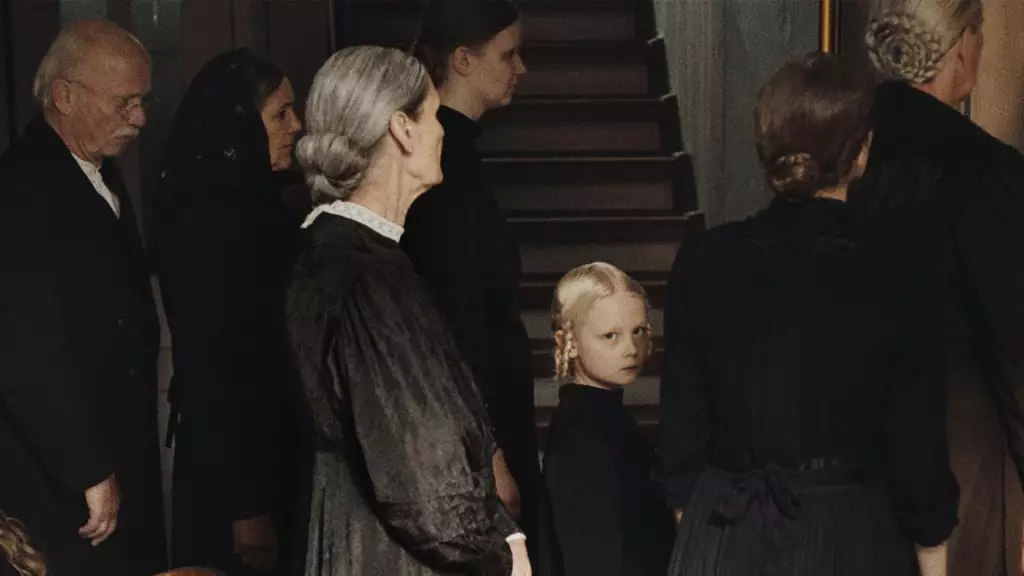The Cannes Film Festival has a notorious reputation for building momentum slowly, as films vie for attention under the glitz and glamour of its iconic red carpet. However, this year has taken everyone by surprise, with “Sound of Falling,” directed by the enigmatic Mascha Schilinski, stirring immediate buzz since its inception. No longer just whispers in the corridors, the excitement surrounding this film has escalated into a full-blown conversation that challenges conventional notions of cinema.
Hoisted into the spotlight on just the second day of the event, the film’s early placement in the competition suggests a calculated risk taken by the Cannes selectors. In a world where established filmmakers often dominate festival programming, Schilinski’s relative obscurity only heightens the intrigue. A strategic investment from mK2, securing world rights for a substantial sum, speaks volumes of the film’s promise and the trust placed in the emerging director’s vision.
An Epic Journey through Time
“Sound of Falling” weaves an ambitious narrative across generations, following four girls from disparate time frames as they navigate youth on a German farm. This premise not only reflects personal experiences but also invites viewers into an intimate exploration of broader themes such as identity, memory, and the passage of time. The deft intertwining of these lives creates a tapestry that resonates deeply with audiences, allowing for emotional depth and stunning storytelling.
Critics have showered praise on the film, with Damon Wise asserting in his glowing review that what Schilinski achieves transcends mere cinematic expression—it’s an “all-timer.” Such accolades are not just fluff; they reflect a new standard in narrative filmmaking that blends existential exploration with visceral visual storytelling. In a market saturating with formulaic offerings, “Sound of Falling” emerges as a refreshing anodyne, eliciting comparisons to classic cinema while simultaneously forging its own unique path.
Innovative Storytelling
The inventive use of time and space invites audiences to question the very essence of what it means to experience a film. As “THR” noted, this creation doesn’t conform to usual cinematic boundaries. Schilinski’s vision prompts viewers to reassess their understanding of storytelling and the cinematic experience itself. With a narrative that appears to dissolve temporality itself, it begs the question: how has cinema evolved, and more importantly, how will it continue to transform?
The fact that a film capable of inciting such dialogue arises from a relatively unknown filmmaker serves as both an inspiration and a challenge to industry norms. The question looms—are buyers and producers ready to embrace a project that boldly redefines storytelling? As studios scramble to secure distribution rights in anticipation of its potential success, this film looks poised not just for festival accolades but for a broader cultural impact that could redefine independent cinema.
The Rise of a New Cinematic Voice
With its powerful narrative and emotional gravitas, “Sound of Falling” is ushering in a new voice in cinema. Critically acclaimed for its breathtaking visuals and storytelling prowess, the film stands as a testament to storytelling that can resonate internationally yet remain profoundly personal. Schilinski’s debut feature, “Dark Blue Girl,” hinted at her potential, but this follow-up showcases an artist whose vision commands attention.
As agents and managers flock to align themselves with Schilinski in the wake of Cannes fervor, one must consider the potential fallout for artistic integrity should mainstream industry interests overshadow her original vision. This is a moment that demands careful navigation; the path towards success does not always align with the preservation of artistic authenticity.
In a vibrant Cannes landscape filled with pastel-colored dreams and seductive narratives, Mascha Schilinski’s “Sound of Falling” shines a light on the extraordinary possibilities within cinema, blending the personal and universal in a way that ignites profound engagement. The resounding question remains: will this film be the catalyst for a broader transformation in how we perceive and appreciate the art of filmmaking? In the midst of the clamor, “Sound of Falling” asserts itself not simply as a film but as a crucial dialogue in the ongoing conversation about what it means to be human in a complex, interwoven world.

